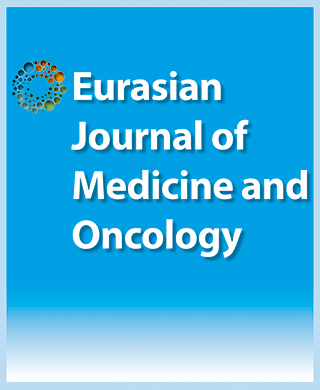

SARS-CoV-2 Related Protein Expression May Predict Vulnerability for Developing COVID-19 in Cancer Patients
Ashutosh Kumar1, Ravi K Narayan2, Vikas Pareek3, Chiman Kumari41Etiologically Elusive Disorders Research Network (EEDRN), New Delhi, India, 2Department of Anatomy, All India Institute of Medical Sciences (AIIMS), Patna, India, 3National Brain Research Center, Manesar, Haryana, India, 4Department of Anatomy, Postgraduate Institute of Medical Education and Research (PGIMER), Chandigarh, India,
Dear Editor, Ongoing epidemic of Coronavirus disease (COVID-19) has presented new challenges to the oncologists. Recent studies have suggested higher COVID-19 related mortality in cancer patients (1), reasons for which are currently little understood. Although, COVID-19 primarily causes acute respiratory distress syndrome (ARDS), widespread inflammation and multi-organ dysfunction are common in progressed disease. Increased fragility, age associated factors, and organ specific or systemic dysfunctions in cancer patients may add to the COVID-19 related pathology increasing the chances of mortality (2). Apart from these obvious risk factors, whether there is a cancer specific vulnerability to COVID-19 is scarcely reported. COVID-19 is caused by a new coronavirus strain ‘Severe acute respiratory syndrome coronavirus-2 (SARS-CoV-2)’ from the family of betacoronaviruses. SARS-CoV-2 binds to angiotensin converting enzyme 2 (ACE2) protein present on the surface of human epithelial cells which facilitates its entry inside the cell (3). For ACE2 mediated cell entry of the SARS-CoV-2 co-expression of proteases like—Transmembrane protease, serine 2 (TMPRSS2), Cathepsin-L (CTSL) and Furin are essential (3). An analysis of tissue specific expression of SARS-CoV-2 cell entry factors ACE2 and TMPRSS2/CTSL/Furin in human cancer patients can inform on their vulnerability for developing COVID-19. We performed in silico analysis of open access data for SARS-CoV-2 related proteins available on Human Protein Atlas (https://www.proteinatlas.org/humanproteome/sars-cov-2). Human Protein Atlas is a standard database for protein expression in normal and pathological human tissues including 20 different types of cancer (4).The details of the laboratory and statistical methods used to generate expression data used for this study is available on https://www.proteinatlas.org/about/assays+annotation. We noted high tissue expression of the viral entry factors in certain specific cancers (Fig. 1). ACE2 expression was detected in many but was specifically enhanced in renal cancer (detected in 100% of cases) (Fig. 1a&b), and had significant expression in colorectal, gastric, and pancreatic cancers (Fig. 1b). All these cancers also had significant expression of TMPRSS2, CTSL, and Furin (Fig. 1b). Higher expression of ACE2 is regarded favourable for the renal cancer, however it may also make patients vulnerable to SARS-CoV-2 infection (4) with an increased chance of renal dysfunction in COVID-19 (5). Uniquely, prostate cancer patients had highest TMPRSS2 RNA expression. TMPRSS2 is an androgen regulated gene and inhibition of TMPRSS2 using androgen-deprivation therapies (ADTs) has been shown to block or decrease the severity of SARS-CoV2 infections (6). A SARS-CoV-2 cell entry factors based vulnerability for developing COVID-19 appears higher in patients of renal and prostate cancers, however this needs to be investigated further. A conclusive knowledge in this regard can help in prevention and therapeutic management of COVID-19 in these patients. Conflict of Interest Authors declare no conflict of interest. "Data accessibility" statement Data related to this manuscript can be accessed from the corresponding author on a reasonable request. References: 1. Dai M, Liu D, Liu M, Zhou F, Li G, Chen Z, et al. Patients with cancer appear more vulnerable to SARS-COV-2: a multi-center study during the COVID-19 outbreak. Cancer Discov. 2020;10(6):783–91. 2. Sidaway P. COVID-19 and cancer: what we know so far. Vol. 17, Nature Reviews Clinical Oncology. Nature Research; 2020. p. 336–336. 3. Hoffmann M, Kleine-Weber H, Schroeder S, Krüger N, Herrler T, Erichsen S, et al. SARS-CoV-2 Cell Entry Depends on ACE2 and TMPRSS2 and Is Blocked by a Clinically Proven Protease Inhibitor. Cell. 2020;181(2):271-280.e8. 4. SARS-CoV-2 related proteins - The Human Protein Atlas [Internet]. [cited 2020 Jun 1]. Available from: https://www.proteinatlas.org/humanproteome/sars-cov-2 5. Yang J, Li H, Hu S, Zhou Y. ACE2 correlated with immune infiltration serves as a prognostic biomarker in endometrial carcinoma and renal papillary cell carcinoma: implication for COVID-19. Aging (Albany NY). 2020 Apr 27;12(8):6518–35. 6. Montopoli M, Zumerle S, Vettor R, et al. Androgen-deprivation therapies for prostate cancer and risk of infection by SARS-CoV-2: a population-based study (n=4532). Ann Oncol. 2020;S0923-7534(20)39797-0. doi:10.1016/j.annonc.2020.04.479 Figure Legend Figure 1 Expression of SARS-CoV-2 related proteins in human cancers, a. Prevalence of protein expression b. m-RNA expression (Source: Human Protein Atlas). Abbreviations: ACE2-angiotension converting enzyme2, TMPRSS2- Transmembrane protease, serine 2 (TMPRSS2), CTSL-Cathepsin-L, FPKM-fragments per kilobase of exon model per million reads mapped).
Cite This Article
Kumar A, Narayan R, Pareek V, Kumari C. SARS-CoV-2 Related Protein Expression May Predict Vulnerability for Developing COVID-19 in Cancer Patients. EJMO. 2020; 4(4): 353-354
Corresponding Author: Ashutosh Kumar



